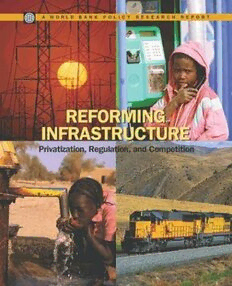
Reforming Infrastructure; Privatization, Regulation, and Competition (Policy Research Reports) PDF
325 Pages·2004·3.701 MB·English
Most books are stored in the elastic cloud where traffic is expensive. For this reason, we have a limit on daily download.
Preview Reforming Infrastructure; Privatization, Regulation, and Competition (Policy Research Reports)
Description:
Infrastructure is crucial for generating growth, alleviating poverty, and increasing international competitiveness. For much of the 20th century and in most countries, the network utilities that delivered infrastructure services—such as electricity, natural gas, telecommunications, railroads, and water supply—were vertically and horizontally integrated state monopolies. This approach often resulted in extremely weak services, especially in developing and transition economies, and particularly for poor people. Common problems included low productivity, high costs, bad quality, insufficient revenue, and shortfalls in investment. Recognizing infrastructure's importance, many countries over the past two decades have implemented far-reaching infrastructure reforms—restructuring, privatizing, and establishing new approaches to regulation. 'Reforming Infrastructure' identifies the challenges involved in this massive policy redirection within the historical, economic, and institutional context of developing and transition economies. It also assesses the outcomes of these policy changes, as well as their distributional consequences—especially for poor households and other disadvantaged groups. And, drawing on a range of international experiences and empirical studies, it recommends directions for future reforms and research to improve infrastructure performance—identifying pricing policies that strike a balance between economic efficiency and social equity, suggesting rules governing access to bottleneck infrastructure facilities, and proposing ways to increase poor people's access to these crucial services.
See more
The list of books you might like
Most books are stored in the elastic cloud where traffic is expensive. For this reason, we have a limit on daily download.
